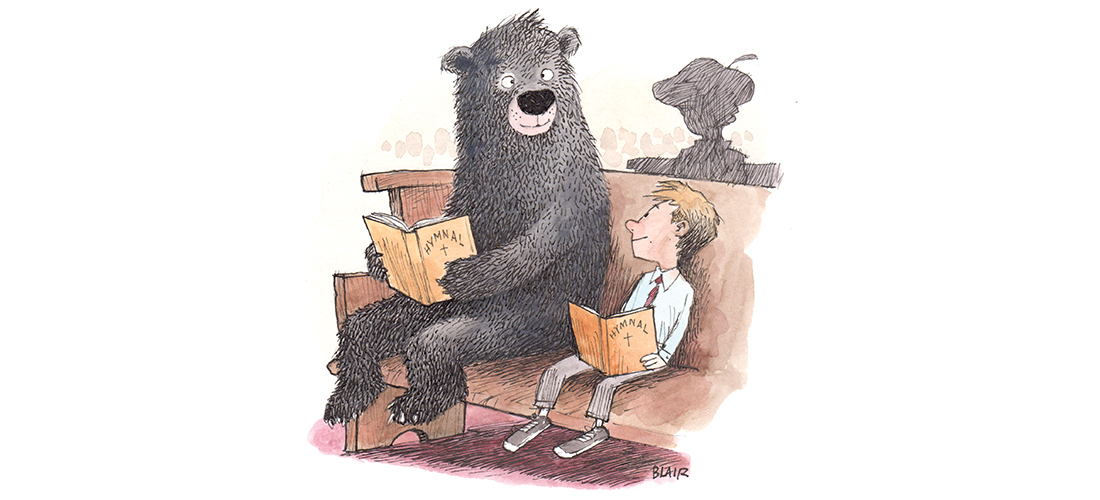
Give Me That Old-Time Music
The comfort of familiar hymns
By Clyde Edgerton
After New Year’s Eve is a good time to think over the past year — or maybe the past 75, especially if something pops up that gives birth to memories that emerge from behind stacks of present-day urgencies and conflicts.
I’ve recently been looking through the hymn book I grew up with in a Southern Baptist church — the Broadman Hymnal: a staple for many denominations back in the day. My looking through this book gave fresh birth to old memories.
Most people, as children, sang songs. For me, it was religious songs. And many children, because they sing songs written by adults, mess up the meanings of words.
In Sunday School at my church long ago, we children sang “Jesus Wants Me for a Sunbeam.” I always heard and thus sang “Jesus wants me for a sunbean.” In my mind’s eye, a sunbean was shaped like a butter bean (translation: lima bean) and had a silvery, bright sheen. I wasn’t sure why Jesus wanted me to be one. Who was Jesus anyway? I’d not quite figured that out by age 4.
In my church, after Sunday School on a Sunday morning, we kids went into the big people’s church and sat still or squirmed for an hour or so — usually with parents, a parent, or someone else’s parents — while things happened around us, and in the choir, and up in the pulpit. We didn’t get the big picture until about the age 12, when we finally clearly understood the nature of the universe and our place in it.
Early on, well before the age of 12, all the hymns seemed benevolent and kind and good, in spite of my recognizing in those songs images of war — as well as of peace — of fear and hope, of the wild and the tame, the obedient and disobedient. But because of my place in my community and church, because of my beliefs, I felt very safe, unthreatened.
Approaching the teenage years, sitting or standing in the big church, we still didn’t always comprehend clearly. There’s that famous example: the hymn “Gladly the Cross I’d Bear.” As: “Gladly, the Cross-Eyed Bear.”
A song like “Standing on the Promises” was hard for me to grasp. I was unable to sustain a meaning for a participial phrase, “standing on,” along with the abstract noun “promises,” in the same sentence. I visualized “promises” as bridge trusses made of human arms. People in a far-off country stood on them. Therefore, the meaning of the song, though I’d sing the printed words, was mangled.
“When the Roll is Called Up Yonder” brought visions of a bread roll with ears and legs — ambling doglike across a green meadow, having been called: “Come, Fluffy. Come, girl.” I was there watching because the hymn said, “When the roll is called up yonder I’ll be there.”
Then, yo, and verily, verily, we became teenagers.
Teenage friends were allowed to sit together, sometimes all the way back on the back row. We’d play “Between the Sheets.” Teenager A would open the hymnbook to a random page and whisper the hymn title to Teenager B. B would say: “Between the Sheets.”
I’m sitting here with the Broadman Hymnal now, as I write. I’m about to open to some random pages.
“Dare to Be Brave, Dare to Be True” . . . “Onward, Christian Soldiers” . . . “Blow Ye the Trumpet, Blow” . . . “I Surrender All” . . . You get the idea (and probably did before the examples).
Now, as an adult, I enjoy singing the old hymns in church. I haven’t yet been able to enjoy contemporary religious music. I like what I heard as a child. Probably not so much because I did or didn’t understand meanings, but because back then I felt at peace. I felt very safe; meanings about life and the universe were absolutely true. Though my outlook has changed, it’s comforting to sing the old hymns, to reconnect with those feelings of security and peace. PS
Clyde Edgerton is the author of 10 novels, a memoir and most recently, Papadaddy’s Book for New Fathers. He is the Thomas S. Keenan III Distinguished Professor of Creative Writing at UNCW.





